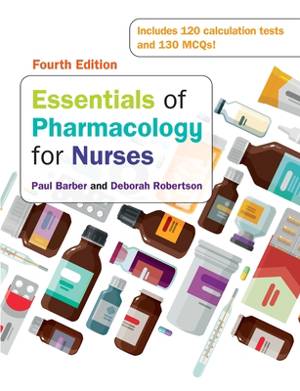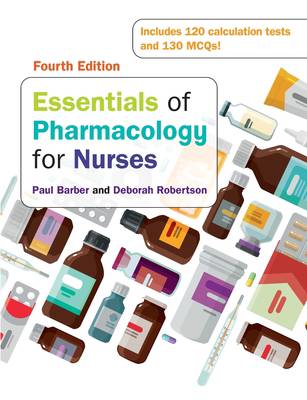
- Retrait gratuit dans votre magasin Club
- 7.000.000 titres dans notre catalogue
- Payer en toute sécurité
- Toujours un magasin près de chez vous
- Retrait gratuit dans votre magasin Club
- 7.000.000 titres dans notre catalogue
- Payer en toute sécurité
- Toujours un magasin près de chez vous
Description
This ideal starter text for student nurses in pharmacology is now into its 4th edition. It makes pharmacology less intimidating by focusing on the knowledge needed at pre-registration level in order to safely and competently practice as a newly qualified nurse.
Praised for its helpful layout and jargon-free language, this updated edition introduces pharmacology in a friendly, informative way, without assuming previous knowledge or a level of confidence in numeracy. This new edition has been carefully expanded to include new chapters on cardiovascular pharmacology and chemotherapy in cancer nursing. There are more details on drugs used in chronic and long-term conditions applied to nursing competencies and standards. It incorporates the new 2018 NMC standards for nursing education and links to practice guidelines. Additional case scenarios have been added spanning all areas of practice and include adult, elderly care, child, mental health and learning disability applications. This allows nurses to apply their knowledge to a range of different people with varying and complex needs to enhance their application to practice.
The book contains:
- 120 calculations and 130 multiple choice questions to assist you in assessing your learning as you work through each chapter
- Clinical tips boxes linking pharmacology to nursing practice
- 50 person centred case scenarios across a range of practice settings
- References to key standards and guidelines
"The book also emphasises the application of the principles of pharmacology to all areas of practice and includes; drug action, drug interactions, side effects and adverse reactions. It is useful for all pre-registration students and those on post qualifying or continuing professional development courses where pharmacology is a component.
Overall, this book is an excellent resource for healthcare students that will support their learning throughout their training and beyond. It covers fundamental concepts of how the major classes of medications exert their therapeutic effect, but also how side effects and adverse reactions can occur. Chapters on legal aspects of medication administration and drug calculations enhance this usefulness of this book - all of which are supported by example questions, calculations and clinical 'tips'. This book has been fully updated to reflect the 2018 NMC standards and as such provides a one-stop shop for any students studying safe administration of medications."
Dr Andy Powell, Physiology Lead for Nursing Birmingham City University
"The outlay of the chapters is easily navigated and the level of the knowledge that the book starts at is at a basic level enough for any student nurse from year 1-3 to start with and builds in complexity. They are in lovely bite-size chunks that are easy to read and easily understood. The 10 MCQ's at the end of a chapter are a very useful method of chapter consolidation and the case studies further reinforce learning."
Georgina Cox, Senior Lecturer in Adult Health Middlesex University
Deborah Robertson is a lecturer in nursing at the University of Salford. She teaches on the pre-registration nursing curriculum as well as being involved in post qualifying and post graduate education. She is also author of Essentials of Medicines Management for Mental Health Nurses.
Paul Barber was a Senior Lecturer at the University of Chester. He is co-author of Further Essentials of Pharmacology for Nurses (2012) and contributor and editor of Medicines Management for Nurses: Case Book (2013), all Open University Press. He is now retired.
Praised for its helpful layout and jargon-free language, this updated edition introduces pharmacology in a friendly, informative way, without assuming previous knowledge or a level of confidence in numeracy. This new edition has been carefully expanded to include new chapters on cardiovascular pharmacology and chemotherapy in cancer nursing. There are more details on drugs used in chronic and long-term conditions applied to nursing competencies and standards. It incorporates the new 2018 NMC standards for nursing education and links to practice guidelines. Additional case scenarios have been added spanning all areas of practice and include adult, elderly care, child, mental health and learning disability applications. This allows nurses to apply their knowledge to a range of different people with varying and complex needs to enhance their application to practice.
The book contains:
- 120 calculations and 130 multiple choice questions to assist you in assessing your learning as you work through each chapter
- Clinical tips boxes linking pharmacology to nursing practice
- 50 person centred case scenarios across a range of practice settings
- References to key standards and guidelines
"The book also emphasises the application of the principles of pharmacology to all areas of practice and includes; drug action, drug interactions, side effects and adverse reactions. It is useful for all pre-registration students and those on post qualifying or continuing professional development courses where pharmacology is a component.
Overall, this book is an excellent resource for healthcare students that will support their learning throughout their training and beyond. It covers fundamental concepts of how the major classes of medications exert their therapeutic effect, but also how side effects and adverse reactions can occur. Chapters on legal aspects of medication administration and drug calculations enhance this usefulness of this book - all of which are supported by example questions, calculations and clinical 'tips'. This book has been fully updated to reflect the 2018 NMC standards and as such provides a one-stop shop for any students studying safe administration of medications."
Dr Andy Powell, Physiology Lead for Nursing Birmingham City University
"The outlay of the chapters is easily navigated and the level of the knowledge that the book starts at is at a basic level enough for any student nurse from year 1-3 to start with and builds in complexity. They are in lovely bite-size chunks that are easy to read and easily understood. The 10 MCQ's at the end of a chapter are a very useful method of chapter consolidation and the case studies further reinforce learning."
Georgina Cox, Senior Lecturer in Adult Health Middlesex University
Deborah Robertson is a lecturer in nursing at the University of Salford. She teaches on the pre-registration nursing curriculum as well as being involved in post qualifying and post graduate education. She is also author of Essentials of Medicines Management for Mental Health Nurses.
Paul Barber was a Senior Lecturer at the University of Chester. He is co-author of Further Essentials of Pharmacology for Nurses (2012) and contributor and editor of Medicines Management for Nurses: Case Book (2013), all Open University Press. He is now retired.
Spécifications
Parties prenantes
- Auteur(s) :
- Editeur:
Contenu
- Nombre de pages :
- 298
- Langue:
- Anglais
Caractéristiques
- EAN:
- 9780335248445
- Date de parution :
- 28-05-20
- Format:
- Livre broché
- Format numérique:
- Trade paperback (VS)
- Dimensions :
- 189 mm x 246 mm
- Poids :
- 535 g







